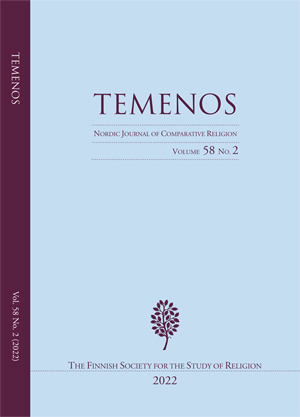Majoritarian Religion, Cultural Justification and Nonreligion
Finland in the International Context
DOI:
https://doi.org/10.33356/temenos.113798Keywords:
Culturalization, Finland, Law, Nonreligion, Religious FreedomAbstract
This article considers the turn to culture and heritage as a strategy for the preservation of majoritarian religious practices, including the implications of such a strategy for nonreligious people. This turn has been observed in analyses of court cases in which religious or cultural nature of symbols and practices has been negotiated. Drawing from previous scholarship regarding the turn, this article pays special attention to Finland by examining if and how cultural justification of symbols and practices takes place. We suggest that the shift to culture applies to Finland, although in international comparison Finnish instances are more prominent in public (media) discourses that refer to laws and legal experts than in court cases. We also argue that one of the consequences of this international development is that it becomes increasingly difficult for nonreligious people and also members of religious minorities to feel part of ‘us’ in a situation where justification by referring to ‘our culture and heritage’ is one of the strategies to define who and what belongs to ‘us’.

Downloads
Published
How to Cite
Issue
Section
License
Copyright (c) 2022 Teemu Taira, Lori Beaman

This work is licensed under a Creative Commons Attribution 4.0 International License.
Author's Guarantee
- The Author acknowledges that the Work will be publicly accessible on the Internet and that such access will be free of charge for the readers.
- The Author guarantees that the Work is her/his original work that has not been published before and cannot be construed as copying or plagiarism. Furthermore, the Author confirms that the Work contains no statement that is unlawful, defamatory or abusive or in any way infringes the rights of others.
- The Author confirms that she/he has secured all written permissions needed for the reproduction in the Publication of any material created by a third party.
User Rights
Under the CC BY 4.0 license, the Author/s and users are free to:
- Share — copy and redistribute the material in any medium or format,
- Adapt — remix, transform, and build upon the material for any purpose, even commercially,
- However, the Work must be attributed to the original Author and source of publication.
The license of the published metadata is Creative Commons CCO 1.0 Universal (CC0 1.0)
Author Rights
The Authors maintain the right to:
- copyright, and other proprietary rights relating to the Work,
- the right to use the substance of the Work in future own works,
- the right to self-archiving/parallel publishing (publisher's PDF allowed).
Rights of Publisher
- The Publisher reserves the right to make such editorial changes as may be necessary to make the Work suitable for publication in the publication, e.g. style of punctuation, spelling, headings and the like.
- The Publisher will publish the Work if the editorial process is successfully completed and reserves the right not to proceed with publication for whatever reason.
- The publication entitles the author to no royalties or other fees. This agreement will be governed by the laws of Finland.






